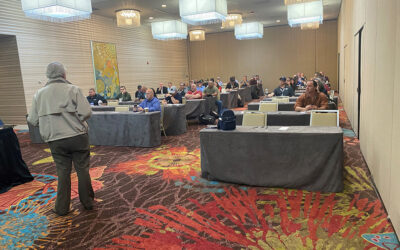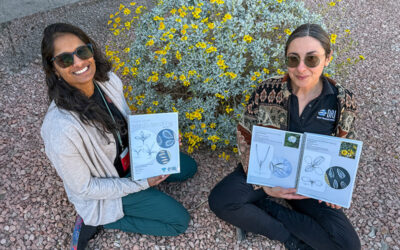DRI’s Behind the Science Blog continues with the third installment of our fall 2022 Research Immersion Internship Series
This fall, DRI brought eleven students from Nevada’s community and state colleges to the Las Vegas and Reno campuses for a paid, immersive research experience. Over the course of the 16-week program, students worked under the mentorship of DRI faculty members to learn about the process of using scientific research to solve real-world problems.
Our Behind the Science Blog is highlighting each research team’s accomplishments over a series of five stories. Previous stories covered Tiffany Pereira’s interns as they tracked elusive desert tortoises in the desert of Las Vegas, and Erick Bandala’s student interns on their quest to find solutions for communities struggling with high concentrations of fluorides in their drinking water.
In this story, we highlight the work of two student interns and their research in international Water, Sanitation, & Hygiene (WASH) development issues in Ghana. These students are building on decades of DRI-led research focused on improving access to clean drinking water in Ghanaian communities.
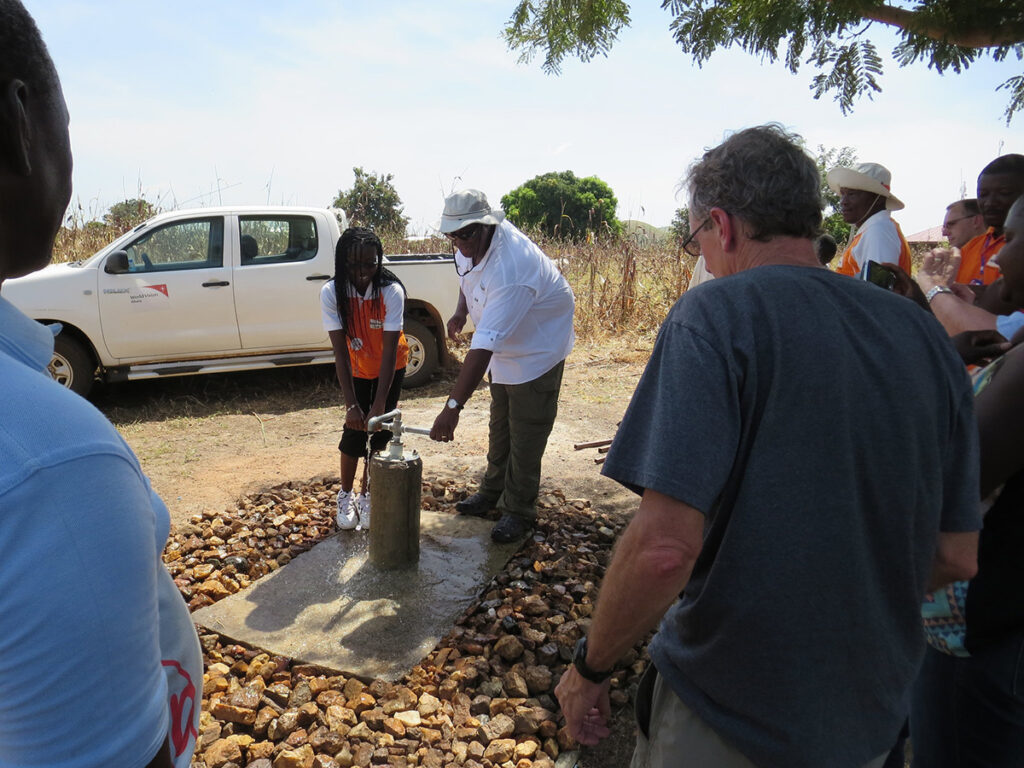
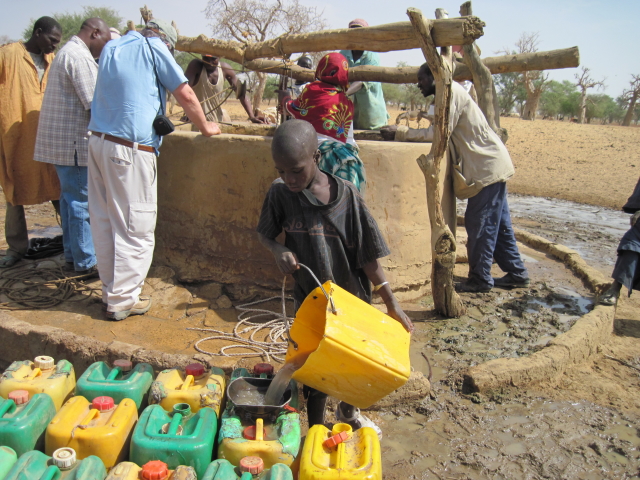
Student Researchers: Anjali Bhatia and Anida Bouakhasith
Faculty mentor: Braimah Apambire, Ph.D., Director, Center for International Water and Sustainability (CIWAS)
Additional Mentor: Palistha Shrestha/ Research Scientist, Program Manager, CIWAS
As communities all over the Southwest continue to face challenges tied to severe drought, water accessibility is becoming an increasing concern. Here at DRI, research in water sustainability extends to communities far beyond Nevada.
More than 2 billion people lack access to safe drinking water and 3.6 billion people do not have access to safely managed sanitation services. Water contamination and poor hygiene are driving 88% of all diseases in developing countries. To address these needs, the United Nations established the Sustainable Development Goals – a set of 17 goals to improve living conditions of people around the globe. Goal #6 is to ensure availability and sustainable management of water and sanitation for all by 2030. This is an ambitious goal – according to the United Nations, reaching this goal would require quadrupling the current rate of progress.
Constructing water systems is only the first step in managing water sustainability, as many developing countries continue to experience the breakdown of water infrastructure and inadequate water treatment. Access to safe, clean drinking water is an underlying issue in Ghana, where a 2019 World Health Organization (WHO)/UNICEF report found that 32% of people in rural communities lacked access. Under the mentorship of Braimah Apambire, interns Anjali Bhatia and Anida Bouakhasith analyzed the effectiveness of water systems, water quality, and health impacts surrounding water services. Their work highlights the importance of community-centered research to understand the long-term sustainability of water infrastructure.
“Water is an essential part of our everyday lives,” said intern Anjali Bhatia. “In developing countries, access to safe drinking water is a real and current issue and something we are striving to fix. The first step is to know what each community needs and continuing to address those specific needs.”
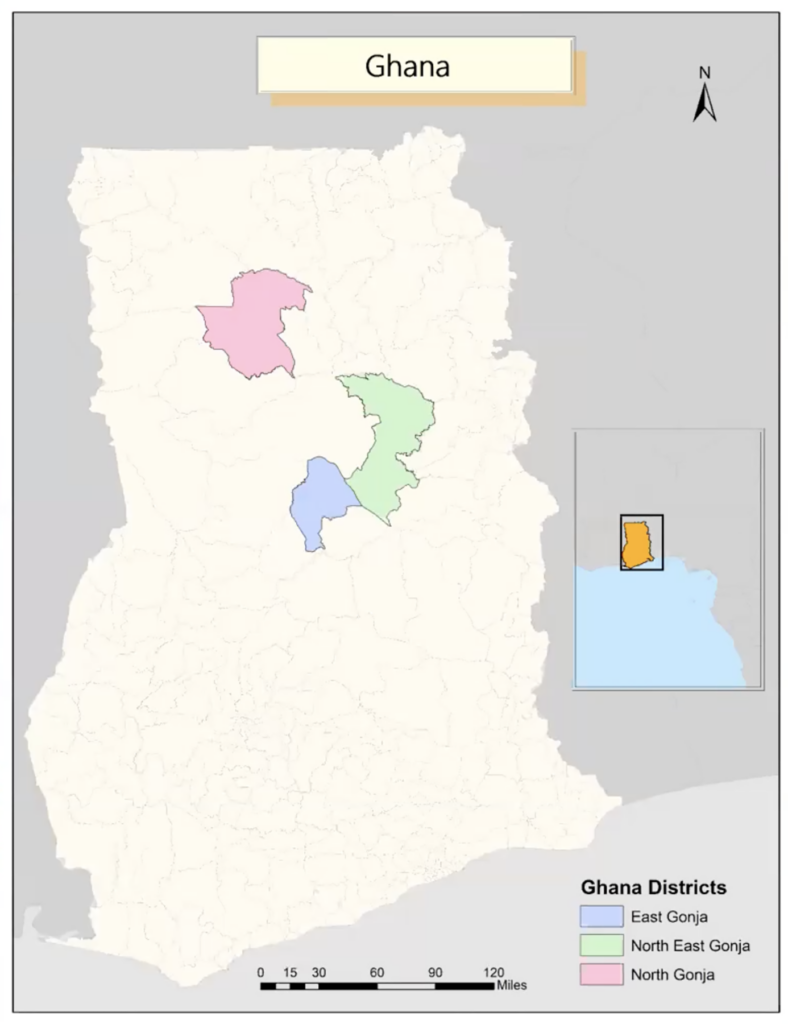
A map of the districts in Ghana where research was focused: East, North, and Northeast Gonja districts.
Community-Centered Research
During their 16-week internship, Bhatia and Bouakhasith evaluated data collected from the Circuit Rider Program in Northern Ghana. Since 2016, this program has aimed to provide training and materials to Ghanaian communities in order to build their capacity for maintaining functional water systems. By focusing on supporting local technicians with funding and training support, the Circuit Rider Program addresses the main challenges by ensuring that rural water systems are maintained, and water quality is adequately tested.
The interns evaluated data collected from three Ghanaian regions: East, North, and Northeast Gonja districts. An 18-question survey inquiring about water access, quality, and time spent accessing water was distributed to various households throughout the districts. When asked what their main source of water is, 50% of households in East Gonja reported their main source of water was through hand pumps or surface water. In the Northeast district, 65% of households also reported surface water as their main source of water. Surface water — when left untreated — can contain dangerous levels of arsenic, fluoride, microplastics, and other substances linked to the transmission of diseases.
“Surface water can often contain bacteria, parasites, viruses, and other contaminants,” Bhatia said. “It’s often required that the water is treated before it is safe to drink.”
When asked how long it takes to collect their water, the three areas varied. While 50% of Northern Gonja households reported they have at-home access, more than 60% of households across the three districts reported it takes them up to half an hour or more to access water.
Collecting water can involve long and risky journeys. Limited accessibility along with poor sanitation can affect an individual’s well-being and impact other social and economic areas of life. “It puts into perspective how often we take for granted how easily accessible it is to get water. That’s time they could spend doing something else,” said Bhatia.
All three communities were also asked how they would rate the quality of water from the source they are drinking from. While 95% of households in North Gonja evaluated their water quality as good, it was the opposite for Northeast district communities, where 97% of households described their water quality as poor and even “cloudy, salty, and colored,” with a bad smell.
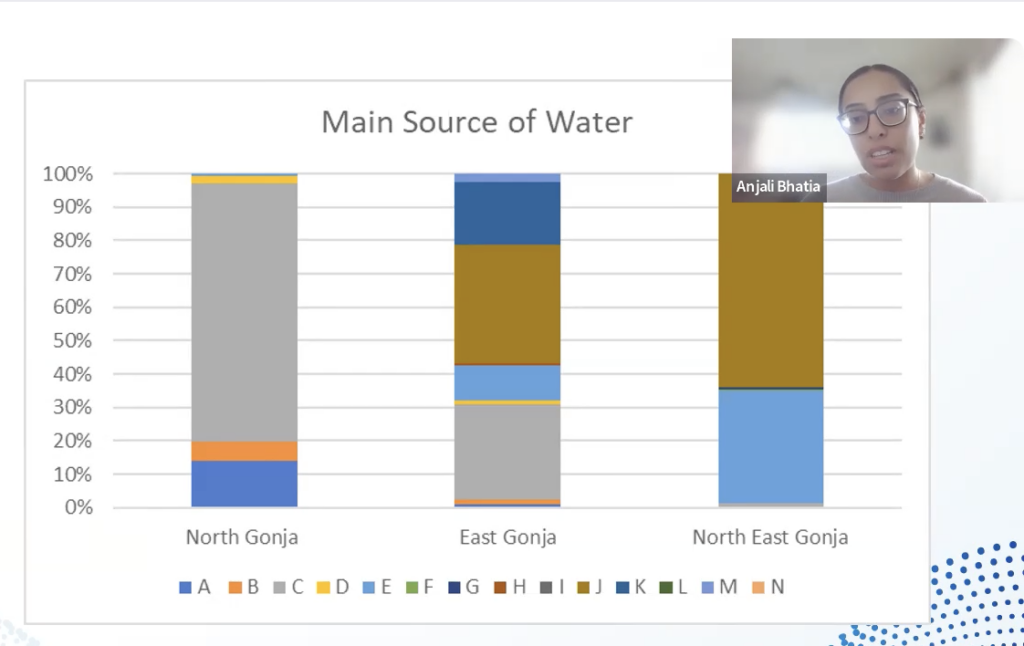
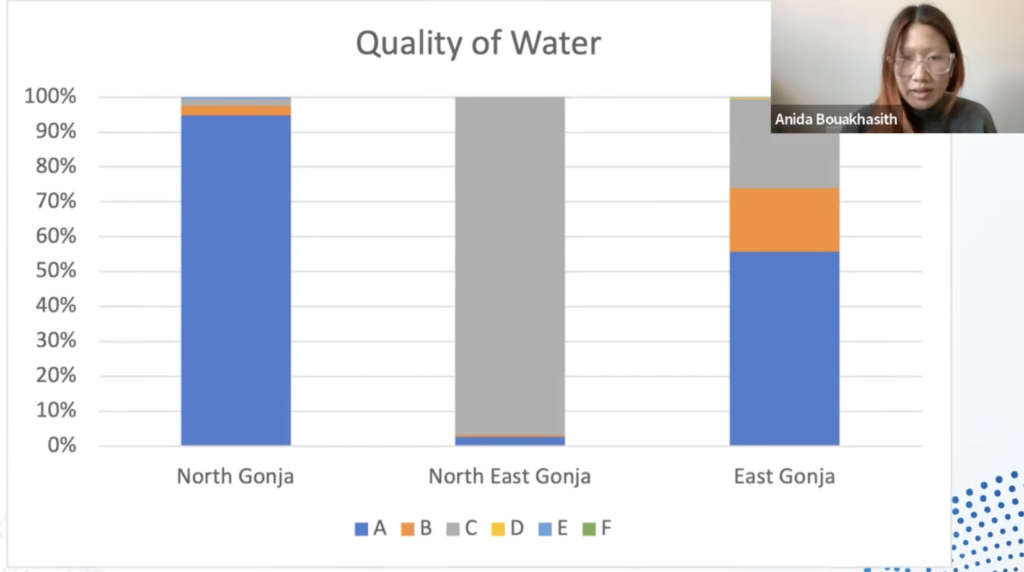
Where To Go From Here
All the survey data received from rural communities in Ghana help piece together what is needed to ensure effective water systems. Bhatia and Bouakhasith’s data analysis shows the crucial attention needed towards the water systems already put in place and the potential health impacts on households across the region.
“Getting direct feedback from these communities allows us to see where we need to make changes, what changes need to be made, and with that information we can make those changes,” said Bhatia.
“The internship program is an opportunity to develop important professional and technical skills,” said Braimah Apambire, their faculty mentor. “It helps students become even more passionate about helping others and using science to make a positive impact on the world.”
More Information
To learn more about the DRI Research Immersion Internship, go to https://www.dri.edu/immersion/.
To learn more about DRI’s Center for International Water and Sustainability (CIWAS), go to https://www.dri.edu/ciwas/about-ciwas/.
